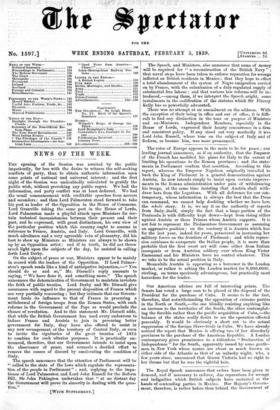NEWS OF THE WEEK.
Trim- opening of the Session was awaited by the public impatiently, far less with the desire to witness the self-seeking :oonfiicts of party, than to obtain authentic information upon some points of national and universal interest ; and the first night of the Session was undoubtedly calculated to gratify the public wish, without provoking any public regret. We had the information, and party conflict was at least deferred. We had the usual commencement with creditable speeches from movers and seconders ; and then Lord Palmerston stood forward,te take his post as leader of the. Opposition in the House of Commons. lord Granville taking the same post in the House of Lords, Lord Palmerston made a playful attack upon Ministers for Aer- tain technical inconsistencies between their present and their past, and he expressed, with great distinctness, his own view of the particular position which this country ought to assume in reference to Fiance, Austria, and Italy. Lord Granville, with much adroitness and a very agreeable vein of pleasantry, did his best to show up Ministers as Ministers are always to be shown up by an Opposition artist ; and if in truth, he did not throw much light upon the subjects of the day, be assisted in calling forth Lord Derby.
On the subject of peace or war, Ministers appear to be mainly in accord with the leaders of the Opposition. If Lord Palmer- ston's speech reads like a kind of anticipative injunction,—" You should do so and so," Mr. Disraeli's reply amounts to saying, "We have done it, and something more." The speech announces the determination of Government to maintain inviolate the faith of public treaties. Lord Derby and Mr. Disraeli give assurances with regard to the present disposition of France which are very partially reassuring ; but they intimate that our Govern- ment lends its influence to that of France in procuring a withdrawal of foreign troops from the Roman States, with such reforms in the Government of the Pope as would preclude the chance of revolution. And to this statement Mr. Disraeli adds, that while the British Government has used every endeavour, to induce France and Austria to join in procuring better government for Italy, they have also offered to assist in any new arrangement of the territory of Central Italy, or even to invite the signitaries of the great treaties of 1815 to combine for such ulterior purposes. It is practically an- nounced, therefore, that our Government intends to insist upon the observance of peace, and counsels a decided effort to remove the causes of discord by amelorating the condition of Italy.
• The speech announces that the attention of Parliament will be "called to the state of the laws which regulate the representa- tion of the people in Parliament"; and, replying to the impa- tience of Lord Palmerston and Lord John Russell for the Reform Bill, Sir John Pakington undertakes that "at no distant day the Government will prove its sincerity in dealing with the ques- tion."
The Speech, and Ministers, also announce that sums of money will be required for "a reconstruction of the British Navy " ; that naval steps have been taken to enforce reparation for wrongs inflicted on British residents in Mexico ; that they hope to effect a total abandonment of the system of Negro emigration carried on by France with the substitution of a duly regulated supply of substantial free labour ; and that various law reforms will be in- trodriced,—among them, if we interpret the Speech aright, some instalments in the codification of the statutes which Sir Fitzroy Kelly has so powerfully advocated.
There was no attempt at an amendment on the address. With the exception of their being in office and out of office, it is diffi- cult to find any distinction in the tone or purpose of Ministers and en-Ministers. Independent Members, especially in the House of Lords, expressed their hearty concurrence in a firm and consistent policy. If any stood out very markedly it Was Lord John Russell, whose tone on the subject of Italy and of Reform, as became him, was more pronounced.


































